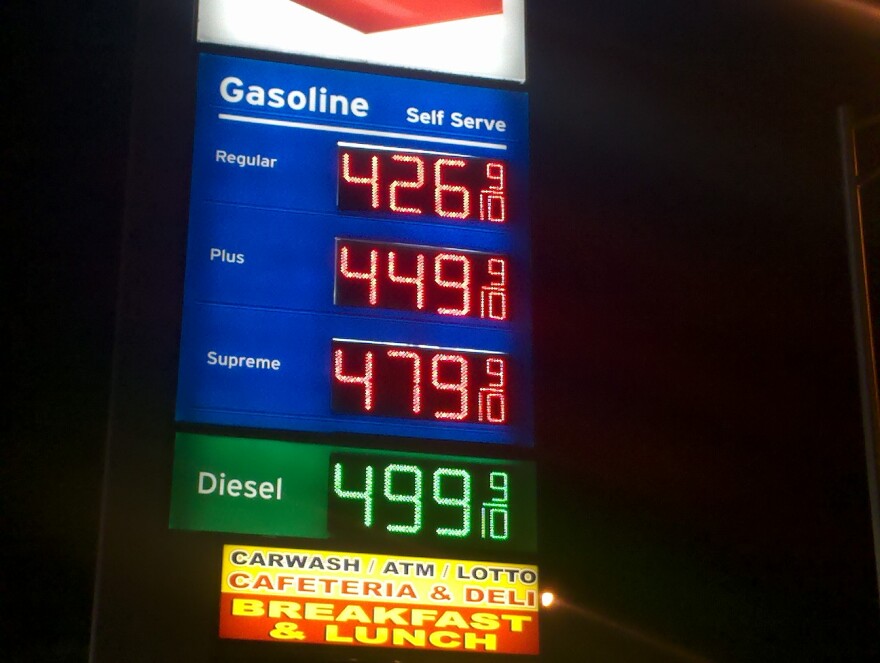Since last week, the average price of gas in Missouri has risen from $3.40 to $3.85.

Despite the price jump, because of Missouri's proximity to Texas, Oklahoma, and the Gulf Coast states, the state is crisscrossed by some of the nation’s larger pipelines. Oil barges also pass through the state on the Mississippi and Missouri rivers, reducing transportation costs.
Prices have spiked even more drastically in surrounding states. In just one week Tennessee, Kentucky, and Illinois have all seen 50¢ increases, and Akansas saw a soaring 60¢ rise.
On Tuesday, President Joe Biden announced to the nation that the United States would be “targeting the main artery of Russia’s economy” and banning all imports of Russian oil and gas and energy in response to the Russian Attack on Ukraine.
The president expanded that Russian oil will no longer be acceptable at U.S. ports, dubbing the action “another powerful blow to Putin’s war machine”.
At the end of February, President Biden announced the US would impose expansive sanctions on the country in an attempt to cripple the Russian economy.
In early March, reports of rising gas prices began in reaction to the government sanctions and Russia’s supplement of oil to the United States.
On Tuesday, shortly after the President's speech, gas prices broke the 2008 record averaging $4.10 a gallon, with a current national high of $4.32 a gallon.

In just the last week the national average has jumped over 50¢.
Southeast Missouri State University Associate Professor of Accounting, Economics, & Finance David Yaskewich says despite the US only receiving 8% of their oil from Russia, in comparison to Europe's 25%, the ban will still impact the Russian economy.
“It still would provide some negative impact on Russia in their economy, particularly their tax revenue because they're very reliant on oil and gas exports in terms of generating revenue,” said Yaskewich. “It wouldn't hurt as much if Europe were to do the same thing, and I think that's why you're not seeing the EU implement the same type of oil or gas ban, at least not yet.”
Yaskewich says he has never seen anything quite like the recent price jumps.
“Towards the end of last year, when the omicron variant came out there was a small decline in oil prices, but they've increased quite a bit, that's something that I haven't seen in my lifetime, is an increase in gasoline this fast and this quickly. And it really is following from the Russia, Ukraine conflict and then the corresponding increase in crude oil prices,” said Yaskewich.
Yaskewich predicts that changes in the price of fuel will be entirely dependent on the current political climate.
“I think in the near term, it's going to follow whatever we see in Ukraine and Russia.
So as long as this conflict continues to go on with an uncertain end, I think we're going to continue to see elevated gasoline prices and the way whether they increase further by a significant amount or they stay elevated in that $4 a gallon range is going to depend on a number of factors and a lot of those are uncertain at the moment,” said Yaskewich.
He says the further sanctions imposed on Russia by the European Union would cause yet another dramatic blow to seeing faster price changes.
“In addition to that, would Russia have any retaliatory actions, that's really the biggest risk in terms of seeing further gas prices increases from here,” said Yaskewich.
Yaskewich notes that the changes in season will also have an effect on the cost of fuel.
“March is a different period of the year than July in terms of driving and fast fuel consumption. We have not hit the peak travel season yet. They’re usually the closing months of spring, and it really picks up during the summer months,” said Yaskewich. “So I would expect that we'll see in the near term, elevated gas prices, perhaps higher gas prices as we enter into the peak driving season of the year.”
Yaskewich says it is too early to tell whether or not the change in fuel costs will have a long term effect on the economy.
“I think there's a significant impact that we're already seeing in terms of gasoline prices, but there's some bigger issues as well here,” said Yaskewich. “Earlier today, we had a new inflation number of 7.9%. These higher gas prices are really coming at a bad time, where we already have had high inflation and we're already expecting higher interest rates to try and reduce inflation, but what's going to happen due to higher gasoline prices from commodity shortage like oil and gas is it's going to make it harder for policymakers to reduce inflation and it's likely that higher gas prices will slow the economy.”
AAA has reported the national price hike as the largest short-term price spike AAA’s data has ever recorded.

